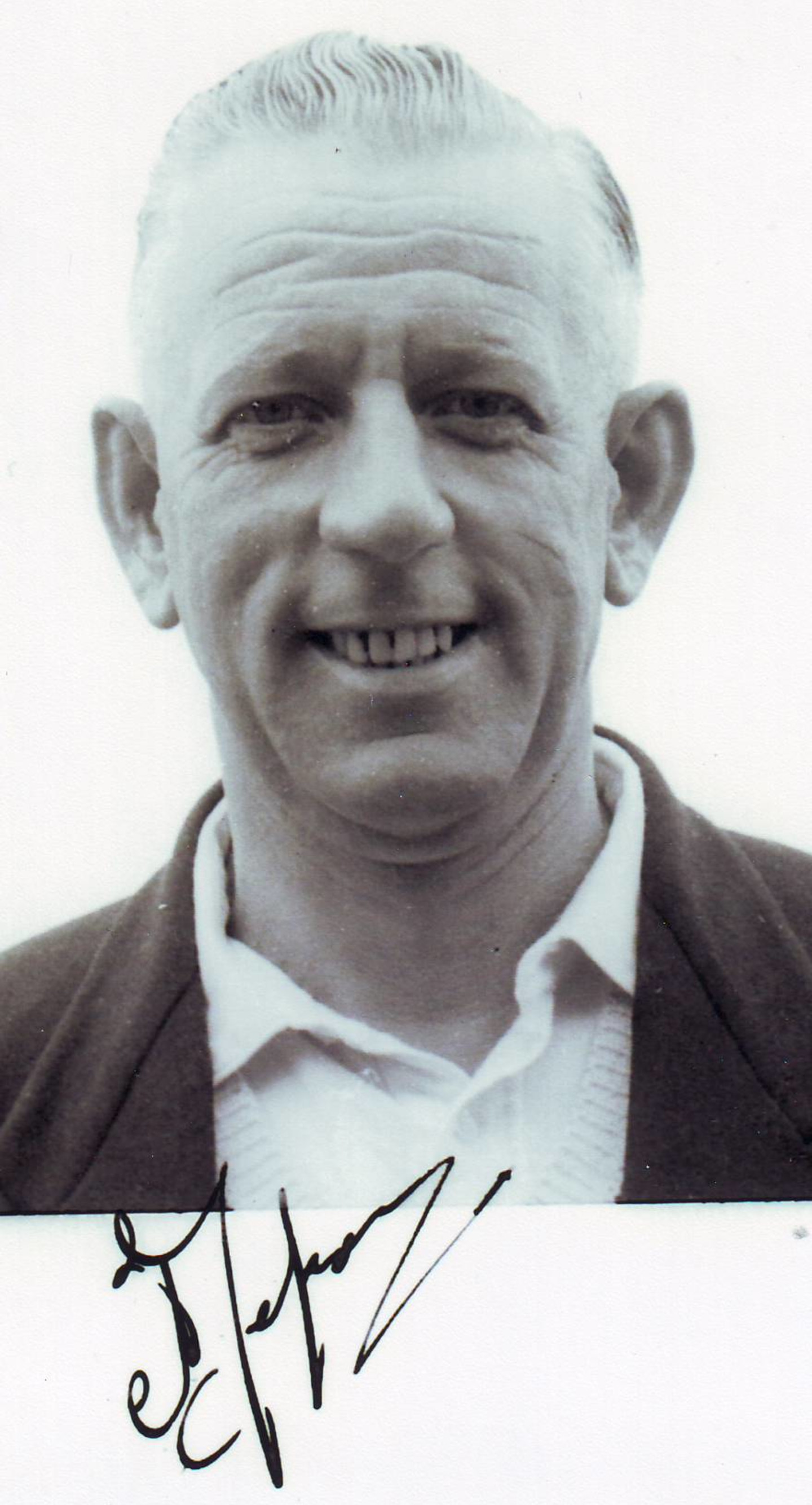Arthur Jepson, who died on 17 July 1997, played cricket for the County from 1938 to 1959, was a professional soccer player, managed football teams outside the main leagues, and stood for many years as an umpire in First-Class cricket – a full and active life in Midlands sport.
A fast-medium right arm bowler, he made his name in the Notts & Derby Border League, playing for, among others, Underwood, where he was when he first applied for a trial at Trent Bridge, in 1936. He was then aged 21, having been born in Selston on 12 July 1915.
It was not until 1938 that he was engaged on the playing staff, by which time he was well–known as a goalkeeper for Port Vale.
With Larwood playing as a batsman, and Butler suddenly taken ill in early June, Jepson found himself appearing frequently in the First Team during his initial season on the staff. By 1939 he was a permanent member of the senior side and had earned his cap.
Like all his contemporaries he lost six seasons due to the Second World War, though he did appear in a few Notts one-day games and occasionally for Yeadon in the Bradford League. As Bill Voce was unavailable for many matches, still awaiting release from the Forces, Butler and Jepson carried the Notts attack in 1946.
Matters became even more serious in 1947, when Voce announced his retirement and Frank Woodhead, the fourth seamer, moved into League cricket. Jepson bowled 1,195 overs that summer, taking 115 wickets at 27.78 each. His robust batting was also in evidence and he averaged over 20, usually coming in at Number 8 or 9.
In addition to his essential part as a bowler and his useful batting Jepson was one of the safest catchers on the county circuit – no doubt attributable to his continued winter occupation as a League goalkeeper, now with Stoke City.
Butler and Jepson carried the attack through to 1952. Their talents were overtaxed and they found themselves not only the attacking opening bowlers, but all too often used as stock seamers.
The pitches at Trent Bridge also told against them. Two factors changed all that in 1953 – the square at Trent Bridge was relayed and Bruce Dooland arrived. Jepson’s figures before and after tell their story: in 1952 he took 53 wickets at 37.11 runs each – he was now aged 37 and ‘over the hill’ – but in 1953 he took 78 wickets at 25.43 runs each. At 41, in 1956, he captured 83 wickets at 21.07 runs each. To put that in perspective, it was a better record than England bowlers, Tyson, Bailey and Moss.
The following summer, with Simpson absent for many matches having back trouble, Jepson was called upon to captain the side. Having originally been awarded a Benefit in 1951, in 1958 he was granted a further Testimonial season in recognition of his long and valuable service.
The then England captain, Peter May commented in 1958: “Arthur Jepson has been a splendid bowler for his county over many years and his fitness is a fine example to the aspiring young cricketers of today.”
Jepson retired, aged 44, at the close of the 1959 season. The following summer saw him on the First-Class Umpires List and he was to officiate in county and international matches for 26 years.
Perhaps his most notable domestic engagement was the now famous Gillette Cup semi-final between Lancashire and Gloucestershire in 1971 that finished in deepening gloom. Legend has it that when Lancs skipper (and later Notts player-manager) Jackie Bond complained about the light, Jepson pointed into the sky, asking, "What's that up there"? "The moon", replied Bond; "Well, if tha' can see that far, there can 't be much wrong with the light" was Arthur's response and the game was played to its murky finish (Lancs won).
Jepson also stood in four Tests – the first back at his old stamping ground of Trent Bridge in 1966 for England v West Indies, a match best remembered for Basil Butcher’s double hundred. Jepson also umpired five ODIs, including three in the 1975 World Cup. After retiring finally from the cricket field, he worked at Bulwell Hall Park Golf Club, where his son was the professional.
Jepson’s best analysis was eight for 45 against Leicestershire at Trent Bridge in 1958 – he also took his 1000th first-class wicket in the course of the same game. His only century was 130 v Worcestershire at Trent Bridge in 1950, when he and Reg Simpson added 270 for the 6th wicket. In Notts matches he hit 6,351 runs, average 14.34 and made 390 appearances.
In his footballing career he was goalkeeper for non-league sides Newark Town, Mansfield Town and Grantham Town before playing for Port Vale either side of World War II. He then spent 1946 to 1948 in the top-flight with Stoke City, before winding down his career following a two-year stint with Lincoln City. He later turned out for non-league sides and briefly managed Long Eaton United and Hinckley United.
May 2023
Nottinghamshire First-Class Number: 368
